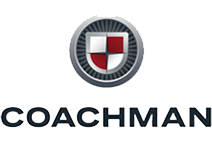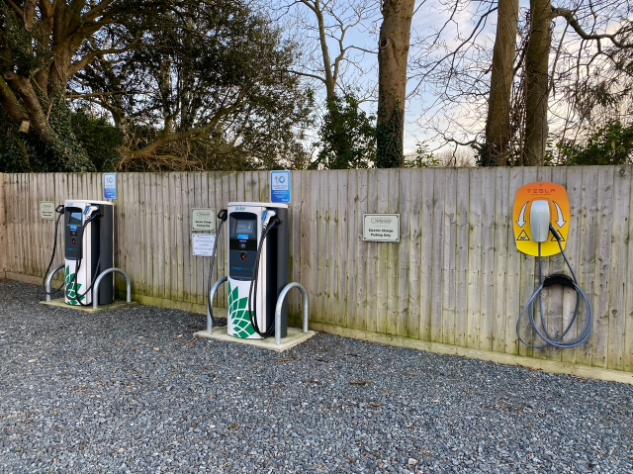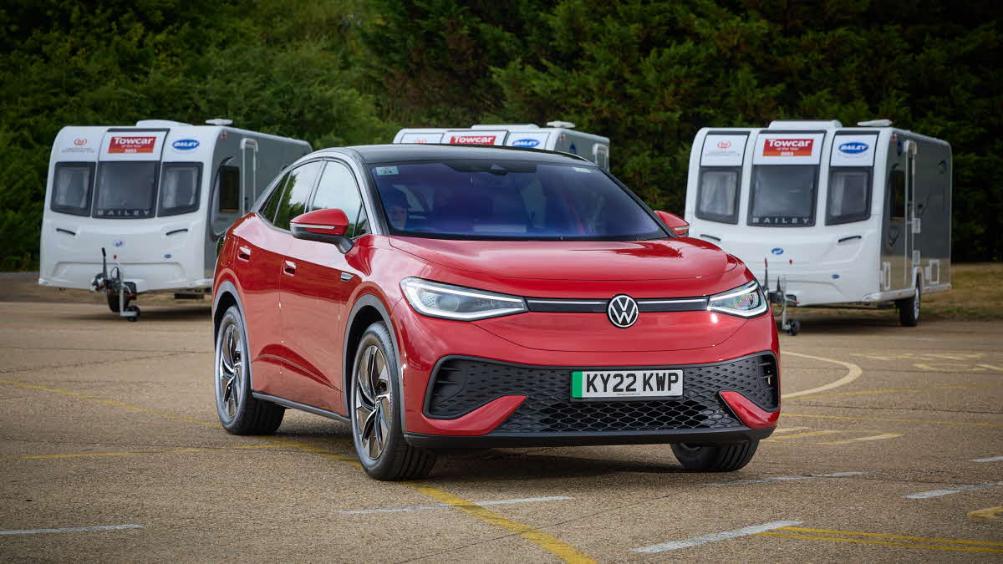John Sootheran delivers the ultimate guide to towing with an electric vehicle (EV)
Love ’em or hate ’em, EV’s are here to stay, whether that’s a Tesla model or from one of the legacy brands we all know and love.
You’ll see a dozen reasons online why battery-electric vehicles (BEVs) don’t or won’t work. Though I’m sure 99% of the naysayers have never driven one.
I’m a confirmed petrolhead, having worked on two of the world’s biggest and best automotive magazines, and I’ve driven everything from a Lada to a Lamborghini. My message is ‘be open-minded’… because that’s what it took to go from ubiquitous ‘horse-power’ to the internal combustion engine, 120 years ago.
The quick answer to the headline question is a resounding ‘YES’! But that response has several caveats, which we’ll explore in this Q&A article.
Hang on, hasn’t the 2030 petrol and diesel combustion-engine ban already been cancelled?
No, the ban has been pushed back to 2035. That said, manufacturers still have to hit a 2030 target of 80% of their new cars and 70% of new vans being zero-emissions. By 2035, that number is 100%.
Does that mean I won’t be able to tow a caravan after 2035?
Not at all. Petrol and diesel cars are likely to be available to buy new, right up to the 2035 deadline – although prices could rocket as the supply drops significantly.
Of course, pre-owned internal combustion engine (ICE) vehicles will still be available after that date, and well-maintained ones could last for decades. However, it’s anyone’s guess as to whether there will still be petrol stations on every corner come 2035.
Electric vehicles and alternatively-fuelled vehicles are expected to make up the vast majority of car sales by 2035. It’s likely that these will make excellent tow vehicles, as they are already well on the way to achieving that goal. In fact, today’s electric cars and vans are well suited to towing in many ways.
So, EVs can tow a caravan, then?
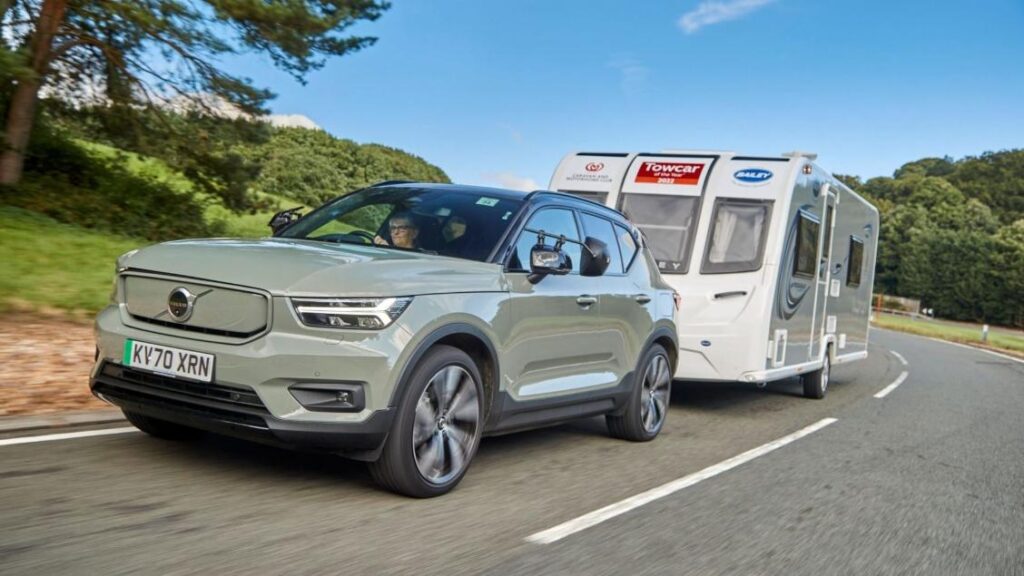
Yes, they can. In reality, several characteristics of EVs make them ideal for towing, but a couple don’t. Let’s look at the positives first.
- Towing weights – EVs are heavy thanks to the large, dense batteries required to store all that power. A biggish electric car, like VW’s SUV-style ID.5, which is just 6cm longer than a VW Tiguan, weighs 2.65 tonnes, which is more than most Range Rovers! This extra mass completely outweighs every caravan, which is another bonus when towing. It puts the towcar in complete control of any van.
- Towing stability – Much of this weight is low-down in the chassis. This creates a low centre of gravity and an exceptionally stable towing platform.
- Towing torque – Electric motors deliver big torque (pulling power), and they do it from zero rpm. This means, whether you’re pulling away from a junction, or accelerating onto a motorway, you have a huge amount of towing power to get up to speed quickly (and safely). Turbo diesel engines have a lot of torque from low down (around 1500rpm), but they can’t compete with an EV, and petrol cars are even further behind, as their power is developed much higher up the rev range, which means delayed acceleration.
- Regenerative braking – EVs have the option to use the energy from decelerating and braking to recharge their batteries. In a car like the VW ID.5, and many others, this manifests itself as an automated braking effect when you lift the accelerator. Drivers soon get used to this, and it makes driving much easier, as you often don’t need to brake at all! Anecdotally, you should also save money by not having to replace brake pads so often.
- Towing speeds – By towing at a sensible A-road speed of up to 60mph, you will maximise your EV battery power.
The negative aspects of towing with an EV
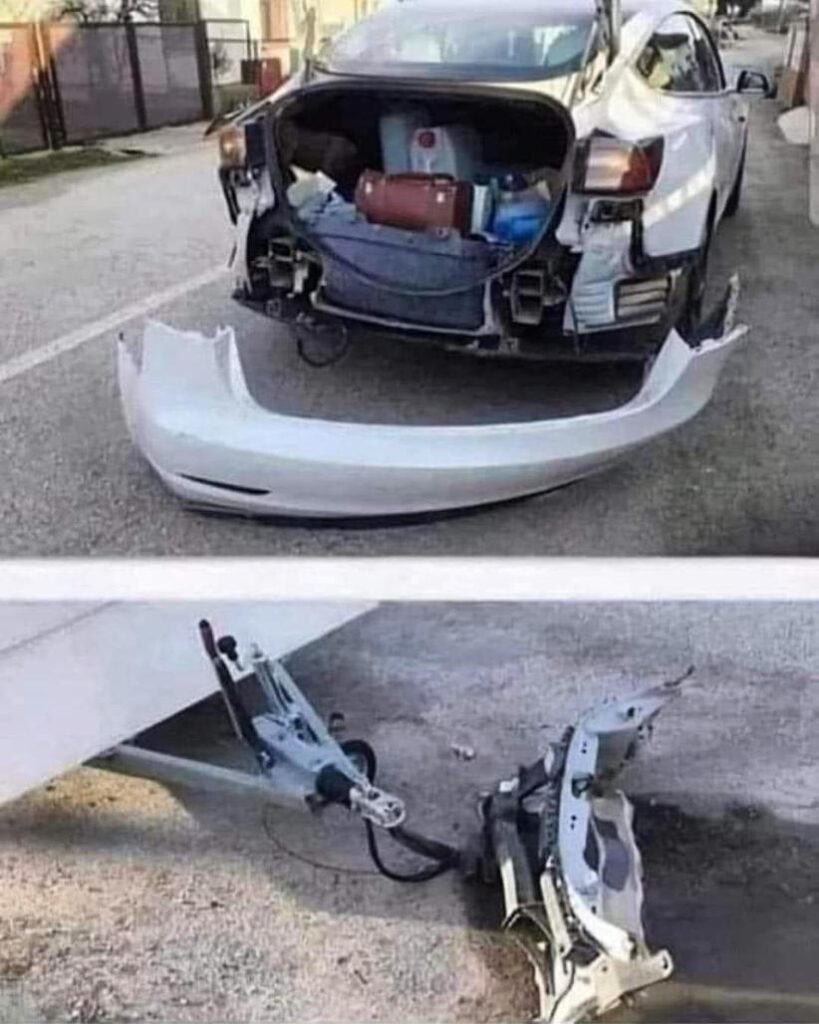
There are plenty of crucial advantages to towing a caravan with an EV, but there are a few negatives, too, which may shape your decision-making.
- EV tow car choice – While the choice of EVs is growing pretty quickly, the number of potential tow cars is still quite limited. That said, you should be able to find something to suit your towing needs, and, with many more models coming on-stream in the next couple of years, that situation will only improve.
Of course, the selection of used EVs coming onto the market is still limited, which may mean that buying a new EV is the only option. New EVs are expensive and typically come at a £10,000 premium to their ICE equivalents. - EV battery life – EV battery longevity is a worry for many drivers who are considering buying an electric vehicle. Scare stories suggest that the expensive batteries in EVs don’t last long. However, as more data is gathered from the first electric cars to hit the road, it seems that they have very long lives of between 10 and 20 years, and up to 200,000 miles. At the point they are no longer viable, the components of the batteries can be recycled. If a battery were to fail earlier in its lifecycle, it would likely still be under warranty from the manufacturer.
- EV towing range – Driving solo, a typical EV has a range of 150 to 300 miles. However, hitch a tonne or more of caravan behind and that range drops substantially. In tests, an EV towing a lightweight (995kg) tourer lost around 45-50% of its range. It went from doing 3.6 miles per kWh solo, to 2.0 miles per kWh with a caravan hitched. Of course, an EV with a large battery giving a solo range of 300 miles, something like the VW ID.5, should still manage a reasonable 150 miles when hitched. However, a smaller MG4 EV with a range of up to 200 miles, may only manage 120 miles when towing. While these ranges aren’t disastrous, they do add the need for a recharge to many longer trips. This adds its own complications, as it’s likely you’ll have to unhitch your caravan and park it somewhere safe for the hour that your EV is on charge, as there is not enough room in most charging bays.
- Towing in winter – Cold weather affects EV performance, as lithium-ion batteries lose a significant proportion of their output in temperatures below freezing (0°C or 32°F). This figure is estimated at 20% at 0°C, and 40% at minus 5.5°C. Naturally, this can make EV towing unviable in winter conditions. EV batteries may also charge more slowly in cold weather. On the plus side, modern EVs often have cooling and heating systems built into their Li-On cells to maintain their perfect operating temperatures.
EV battery capacity explained
Electric vehicle batteries come in various sizes, and the bigger the battery, the more range it will provide for a vehicle of that size and type. EV battery capacity is measured in kilowatt hours (kWh), which reveals the amount of charge they can store. Here are some popular EV cars and their average battery capacities.
- Peugeot e-3008 Long range – 98kWh
- Kia EV9 – 96kWh
- Tesla Model S Dual Motor – 95kWh
- Polestar 3 Long Range Dual Motor – 107kWh
- Volvo EX90 Twin Motor – 107kWh
- Mercedes EQE SUV – 90.6kWh
- BMW i4 – 80.7kWh
- WW ID.3 Pro – 77kWh (most VAG EVs have this capacity)
- Škoda Enyaq – 77kWh
- Hyundai Ioniq range – 74kWh
- Kia Niro EV – 64.8kWh
Data from ev-database.org
How to tow a caravan with an EV?
The principles of safe and efficient towing are the same for EVs as for internal combustion-engined (ICE) vehicles.
However, when towing long distances with an EV, you’ll need to plan your route carefully, allowing for charging stop(s) on the journey, and, if you’re sensible, selecting back-up charging options, just in case your first choice is full or out of order.
Likewise, you can plan ahead and use Google StreetView to identify safe places to park your caravan while you recharge your tow car.
What would be a five-minute fill-up in an ICE tow car could take an hour in an EV, but at least you can use the time to rest, have a coffee, walk the dog or stretch your legs.
Range anxiety may well be an issue when towing with an EV, so make sure you fully charge up before leaving home, and perhaps plan your recharge stop when you’ll have at least 50 miles of range remaining, bearing in mind that hilly or urban driving may seriously reduce your range.
Also remember that your range will drop drastically initially, as the car recalculates for the weight of the van. It should then settle down.
Charging on campsites
Some campsites have EV charging facilities, though high-speed chargers aren’t on the pitches, but in the car park or close to the office.
The Caravan and Motorhome Club allows on-pitch charging, but it must be done through the caravan and not directly from the hook-up post. This will be very slow charging and the cost is £9 per day. Better to use the 22kW or 7kW fast chargers offered by some sites. For example, the CAMC currently has 11 sites with tap-and-charge facilities.
If you use your caravan to charge your EV, it will of course limit the other current you can draw from the hook-up, without causing the circuit to trip. Charging an EV and running the heating or boiler, for example, is likely to overload the system.
Some EVs, including Teslas, can have their charging rate reduced using touchscreen controls. Turning the current draw down from 10A to four or six amps may free up enough current to run other caravan facilities; however, it might be best to charge your EV at night or when you are away from the pitch.
Charging speeds
If you plug your EV into the standard mains at home, you can expect a charging time in excess of 12 hours, depending on your EV. Conversely, if you find a high-speed or superfast charging point, a full charge could take as little as 30 to 60 minutes.
Here’s a chart of typical charging-speed options at UK charging stations, plus how many miles an hour of charge will provide.
| 7kW | up to 30 miles |
| 22kW | up to 90 miles |
| 50kW | up to 90 miles (in 30 minutes) |
| 150kW | up to 200 miles (in 30 minutes) |
How do I find EV charging stations?
Use one of the charging station location apps, such as ZapMap. This app is free and delivers all the information you need for effective route planning and charging.
Fitting a towbar to an electric vehicle
All the major towbar manufacturers supply towbars with specific fitments for EVs, though not all cars are catered for or will take a towbar fitment.
Tom Miller, CEO at Tow-Trust Towbars Ltd, said: “Here at Tow-Trust, we produce bespoke towbars for EVs, and EVs are a big part of our development program for 2024 and beyond.
“This year, we have successfully developed and launched Towbars for the Audi E-Tron, Skoda Enyaq, Volkswagen ID.4 and ID.5, Mercedes’ EQA, EQT, EQC, EQV, and BMW’s iX3 and i4.
“I believe it has taken a while for vehicle manufacturers to get the towing capacity and battery life to sufficient levels for towing, but they are certainly well on their way with it.”
If you’re buying an EV with a view to towing with it, check whether the dealership will retro-fit a towbar, or if it needs to be on the factory order. Also, compare the prices of factory fitting (which can often be north of £1000), with bespoke, after-market fitments from the likes of Tow-Trust or Witter (UK).
I always recommend getting a fully-integrated, vehicle-specific electrical system fitted, as opposed to the by-pass systems that some suppliers recommend. While these may well be cheaper, it’s highly likely that they won’t integrate the car’s control systems entirely with the caravan.
In fact, in some cases, the car may not even know a caravan is being towed, so the lights, suspension and braking may not be automatically adapted and optimised.
What are the best electric tow cars for caravans?
The following EVs have all performed well in tow car awards with the major clubs.
| Kia EV6 | Kerb weight 2090kg Max towing weight 1600kg Price £51,745 |
| Volvo C40 | Kerb weight 2185kg Max towing weight 1800kg Price £62,205 |
| VW ID.Buzz | Kerb weight 2117kg Max towing weight 1000kg Price £52,185 |
| Nissan Ariya | Kerb weight 2222kg Max towing weight 1500kg Price £55,602 |
| VW ID.5 | Kerb weight 2117kg Max towing weight 1000kg Price £52,185 |
| Audi E-tron 55 Quattro | Kerb weight 2565kg Max towing weight 1800kg Price £72,970 |
| BMW iX xDrive 40 | Kerb weight 2585kg Max towing weight 2500kg Price 77,695 |
| Polestar 2 Long-Range Dual Motor | Kerb weight 2198kg Max towing weight 1500kg Price £47,900 |
| Škoda Enyaq iV 80 | Kerb weight 2032kg Max towing weight 1000kg Price £40,970 |
Contact
Tow-Trust Towbars tow-trust.co.uk
Audi – audi.co.uk
BMW – bmw.co.uk
Kia – kia.com
MG – mg.co.uk
Nissan – nissan.co.uk
Polestar – polestar.comŠkoda – skoda.co.uk
Tesla – tesla.com
VW – volkswagen.co.uk
Volvo – volvocars.com

